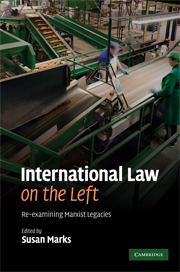Book contents
- Frontmatter
- Contents
- Contributors
- Acknowledgements
- Introduction
- 1 What should international lawyers learn from Karl Marx?
- 2 An outline of a Marxist course on public international law
- 3 The commodity-form theory of international law
- 4 Positivism versus self-determination: the contradictions of Soviet international law
- 5 Marxism and international law: perspectives for the American (twenty-first) century?
- 6 Toward a radical political economy critique of transnational economic law
- 7 Marxian insights for the human rights project
- 8 Marxian embraces (and de-couplings) in Upendra Baxi's human rights scholarship: a case study
- 9 Exploitation as an international legal concept
- Index
2 - An outline of a Marxist course on public international law
Published online by Cambridge University Press: 07 September 2009
- Frontmatter
- Contents
- Contributors
- Acknowledgements
- Introduction
- 1 What should international lawyers learn from Karl Marx?
- 2 An outline of a Marxist course on public international law
- 3 The commodity-form theory of international law
- 4 Positivism versus self-determination: the contradictions of Soviet international law
- 5 Marxism and international law: perspectives for the American (twenty-first) century?
- 6 Toward a radical political economy critique of transnational economic law
- 7 Marxian insights for the human rights project
- 8 Marxian embraces (and de-couplings) in Upendra Baxi's human rights scholarship: a case study
- 9 Exploitation as an international legal concept
- Index
Summary
Introduction
The difficulties in telling an alternative story
There is today an urgent need to offer to students of international law critical alternative texts exploring the nature, character and subject matter of international law. Alternative stories have to be told, for growing international legal regulation is translating into injustice for the subaltern classes in both the Third and First Worlds. But introducing critical alternative texts is not an easy task, given the dominance of mainstream international law scholarship (MILS) in the world of international law. MILS may be defined as an ensemble of methods, practices and understandings in relation to the identification, interpretation and enforcement of international law. This ensemble of methods, practices and understandings comprises a number of features. Four may be mentioned in order to bring out its distinctive nature. First, broadly speaking, MILS is parasitic on an epistemology of law that dictates the fragmentation of social sciences in relation to the creation, interpretation and implementation of international law. It advances a distinctive international law methodology which tells us which practices count in the world of international law and which do not. Such a methodology, going by the name of positivism, excludes a range of social and political practices as falling outside the domain of international law. MILS therefore ends up offering formal/abstract definitions of international law and its doctrines. Second, MILS writes the history of international law as a narrative of progress.
- Type
- Chapter
- Information
- International Law on the LeftRe-examining Marxist Legacies, pp. 53 - 91Publisher: Cambridge University PressPrint publication year: 2008
- 5
- Cited by



